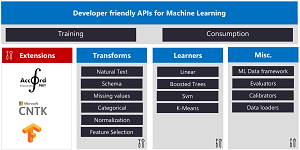Microsoft Unveils Open Source, Cross-Platform Machine Learning Framework
- By David Ramel
- May 8, 2018
Artificial inteligence and machine learning are dominant themes of new developer tooling being introduced at Microsoft's Build developer conference this week, and ML.NET is a prime example.
It's an open source, cross-platform machine learning framework, designed to help .NET developers get in on cutting-edge ML programming without having to learn the underlying technical details associated with creating and tuning machine learning models.
One benefit to Visual Studio coders is the ability to work with ML models in native .NET languages like C#, "without having to learn and use Python," as one developer said in comments section of the announcement post.
The new framework was originally developed at Microsoft Research and was launched as part of the .NET Foundation.
Designed to complement ML and AI development with the company's existing tools such as Azure Machine Learning and Cognitive Services, the early preview will in time receive more capabilities.
 [Click on image for larger view.] ML.NET APIs (source: Microsoft).
[Click on image for larger view.] ML.NET APIs (source: Microsoft).
"With this first preview release, ML.NET enables ML tasks like classification (e.g. text categorization and sentiment analysis) and regression (e.g. forecasting and price prediction)," Microsoft said. "Along with these ML capabilities, this first release of ML.NET also brings the first draft of .NET APIs for training models, using models for predictions, as well as the core components of this framework, such as learning algorithms, transforms, and core ML data structures."
Future supported scenarios, the company said, will include recommendation systems and anomaly detection. Deep learning functionality is also on tap, as it's planned to work with libraries such as TensorFlow, Caffe2 and CNTK, along with general machine learning libraries such as Accord.NET.
Along with additional ML tasks and scenarios and the TensorFlow and CNTK deep learning support, future plans include:
- ONNX support
- Scale-out on Azure
- Better GUI to simplify ML tasks
- Integration with VS Tools for AI
- Language Innovation for .NET
The v0.1 release, whose source code is available on GitHub, works on any platform supporting 64-bit .NET Core, including Windows, Linux, and macOS. .NET Core 2.0 needs to be installed to work with the new framework. More information can be found in the full release notes and a developer guide.
As noted, several readers of the announcement post enthusiastically welcomed the new release. "Now in our latest project, we are building a separate web-service on Python to deal with such kind of AI/ML/NLP tasks (text processing, classification, etc.)," said one. "Hope it will be possible to switch to .NET for those tasks in the nearest feature."
About the Author
David Ramel is an editor and writer at Converge 360.